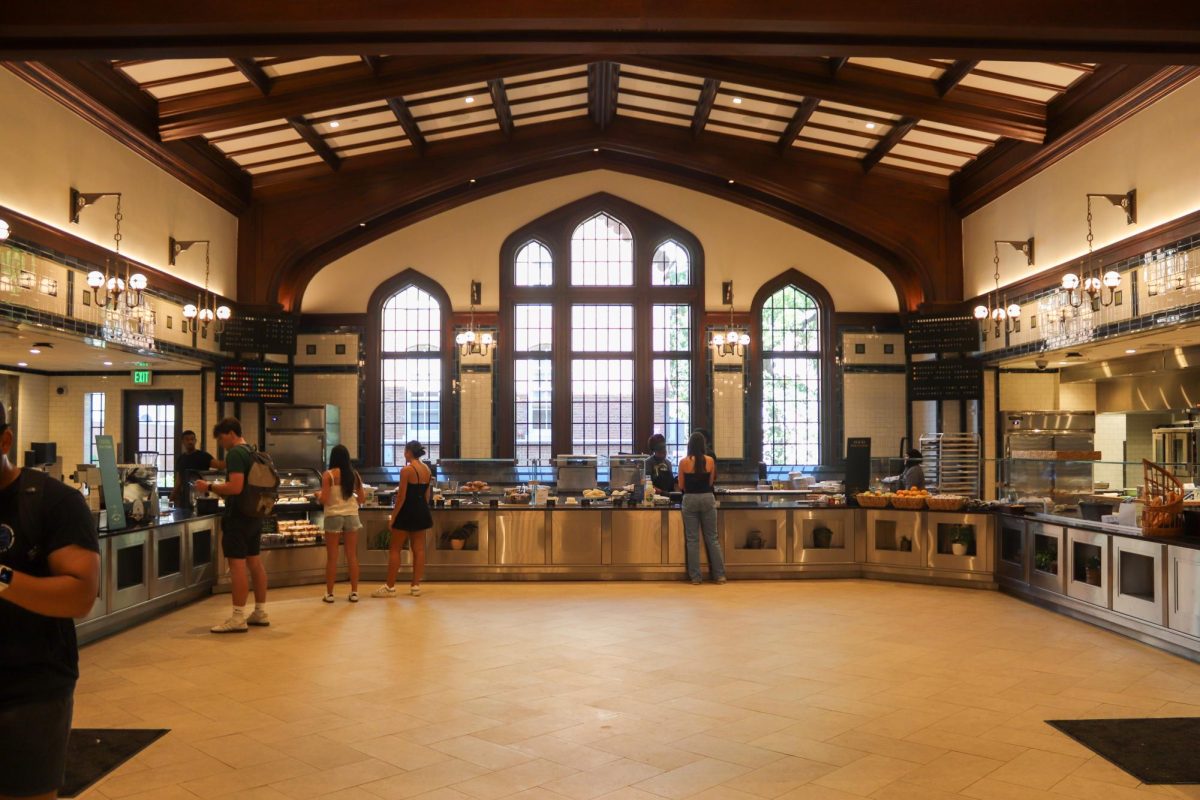Kissam dining employees told The Hustler that Kissam Kitchen will temporarily close on March 10 — the day before spring break — and reopen at the start of the Fall 2023 semester with only gluten-free options. While a university representative declined to confirm the temporary closure of Kissam Kitchen, Rand General Manager Rebekah Beck shared that Campus Dining will be emphasizing specific cuisine identities at each residential college dining hall this semester.
When Kissam Kitchen reopens, it will only serve gluten-free options, according to Kissam dining employees Anne Alukonis, Joseph Hatfield, Amanda Goff and Najah Pumphrey. They added that the Munchie Mart portion of Kissam will permanently close to allow for expansions to Kissam Kitchen. While originally planned for May, Alukonis said the construction date was moved up in order to allocate enough time to finish.
Beck confirmed that Kissam Kitchen will feature expanded gluten-free options in Fall 2023, but a university representative declined to confirm Kissam’s temporary closure.
Sophomore Christopher Lofts added that Vanderbilt Tour Guides were told by Rand General Manager Rebekah Beck that Campus Dining is considering making the Pub the “go-to grill” on campus, phasing out Rothschild’s grill station. Beck confirmed to The Hustler that the Pub is currently being restructured but declined to share further details.
Beck shared that other potential dining changes in the new year include bringing back a pizza station to Rand Dining Hall in place of 2301, which would be moved to Residential College C with expanded allergen-free options. Res College C, which is undergoing construction in the West End Neighborhood, will include a new dining hall but not a Munchie Mart.
Beck added that the idea of moving 2301 to Residential College C to expand allergen-free options is being considered, but that no decision has been finalized yet.
“I want to reiterate that plans and goals change. That’s dependent on resources,” Beck said in an email to The Hustler. “We are striving to capture the students’ vision of what they’d like to see for the dining program — within reason of course.”
Reactions to Kissam Kitchen changes
Alukonis said her primary concern with Kissam Munchie Mart closing during the school year is students’ potential lack of access to food after dinner hours and their safety when walking to other dining halls or Munchie Marts.
“We’re just worried about students having food late at night, especially during finals week,” Alukonis said.
Junior and Kissam resident Will Parrack said he was disappointed about Kissam Munchie Mart closing, citing concern about lack of food access and convenience.
“It’s always very convenient to have a Munchie Mart right downstairs, and now we have to travel to a more central location of campus, isolating those of us on the edge into a food desert after dining hours,” Parrack said.
Senior Kayla Prowell also said she is concerned about Kissam’s temporary closure because she said it provides a space for students with gluten allergies to eat alongside their peers.
“I’m honestly extremely frustrated by this decision. As a student with a gluten allergy, I loved eating at Kissam not only because it was accommodating for me, but the dining hall combined with the Munchie made it a great place for my gluten-eating friends to eat with me as well,” Prowell said. “Yes, SAS accommodations exist, and yes, 2301 is an option but the allergen-free options can be very isolating when you have to always eat it to-go.”
Cultural cuisine identity

Beck said that Dining is also moving towards giving each residential college dining hall a unique “specific culinary identity.” This change aims to craft a holistic dining experience for students and to minimize overlap in menu options, per Beck.
“Our goal is to ensure that each dining hall has a specific culinary identity and is known for a specific cuisine; for example, EBI has a focus on Asian cuisine,” a university representative said in an email to The Hustler. “Our chefs continually work to refine our menus and offerings to reflect student tastes and current trends. At the end of the day, we are committed to offering variety and choice in our dining program.”
In addition to E. Bronson Ingram’s stir fry and pho options, cultural options currently offered at various dining halls include poke bowls at Kissam; the Taqueria at Commons; Fresh Mex, Mongolian Grill and Mediterranean at Rand; and Swaadisht Indian food, Mexican street tacos and Italian food at Rothschild.
“We want each location to be an experience for the student,” Beck said in an email to The Hustler.
Lofts said he is looking forward to the increased diversity of dining options.
“I hate opening the dining hall menus to see some version of pasta and burgers at every location,” Lofts said.
Sophomore Will Ford echoed Lofts’s sentiments, adding that he appreciates Campus Dining’s transparency with its planned changes and desire for student input.
“This clarity was certainly a breath of fresh air, in contrast to earlier perceptions that the staff were disinterested in student opinion. I truly felt in the know, and I’d urge others to take steps to engage and share/provide feedback to better our overall experience,” Ford said.
Other students expressed a desire to see additional cultural food in Vanderbilt’s dining halls to reflect the university’s diverse community.
“There is definitely a lack of diversity in cultural foods and also selection. I hope to see more Chinese dishes in the future,” first-year Anna Chen said. “I hope to see more foods from all sorts of cultures because food definitely helps with making college feel a lot more like home since food plays a huge factor in many people’s identity and cultural backgrounds.”


















Annoyed • Jan 27, 2023 at 1:41 pm CST
I’d honestly much rather campus dining provide food that serves/rotates multiple cultural tastes and options for different students at every dining hall than separate things like this. I go to dining halls based on how close they are and how easily it’ll get me to my next class, not what is being served at the dining hall. Poke bowls were a great lunch option and it’s extremely disappointing to see them going for a shift in direction in campus dining that frankly no one asked for. This just makes it all the more irritating to get food for Kissam residents and people who have classes nearby, both during the close and after.
Campus Dining Disappoints Again • Jan 23, 2023 at 12:38 pm CST
I eat gluten-free due to medical concerns (I break out in hives if more than trace amounts make it to any of my meals) and due to allergen testing limitations, I can’t get an SAS exception. I spent $300 in groceries this month on top of my meal plan, and that is as somebody who has the money to do so (barely) and an on-campus residential option with a fully stocked kitchen. Closing the Kitchen at Kissam leaves me with one option for places to eat at completely safely, and I’m not a coeliac who can’t even deal with trace amounts. There are many people who will cause long-term damage to their health not having a dedicated gluten-free dining hall open for meal times. 2301 is also not open on weekends, because allergies apparently don’t exist then.
poke bowl • Jan 23, 2023 at 12:07 pm CST
The Kissam Poke Bowls are currently one of the best lunch options on campus. Why does campus dining always have to take the best things away from us?
anonymous123 • Jan 23, 2023 at 10:52 am CST
I have a gluten allergy and rely on Kissam for nearly all my meals. It is unfortunately unsurprising that Vanderbilt would do this without warning the students impacted. I have contacted many administration members – they do not care at all. I will be going hungry for the rest of this year.
Stop changing things that work • Jan 23, 2023 at 10:37 am CST
yay, more food deserts! i’m so excited to starve when i get back from lab at 9pm and there’s no munchie. doing this during the school year is absurd.